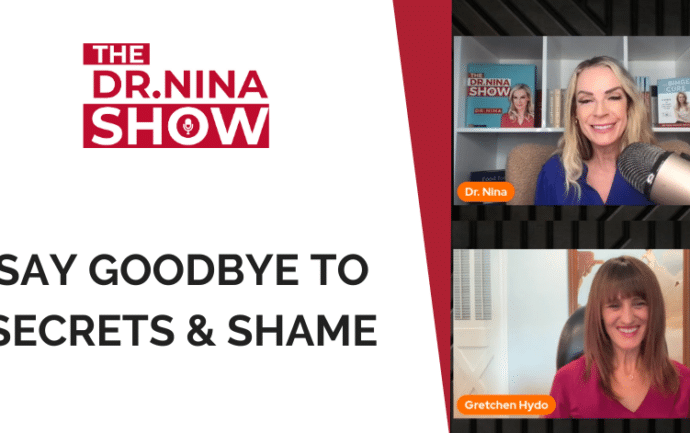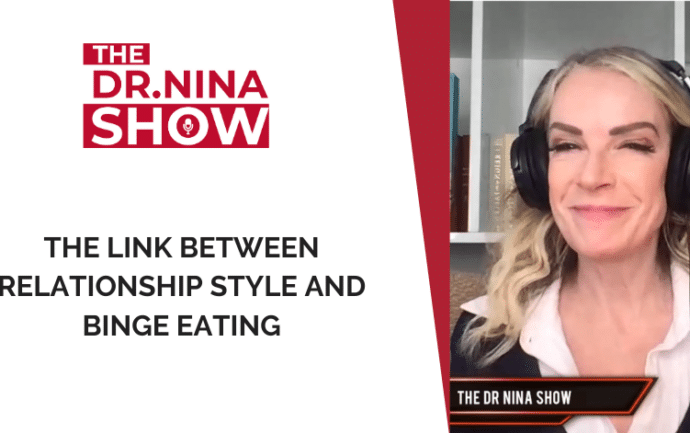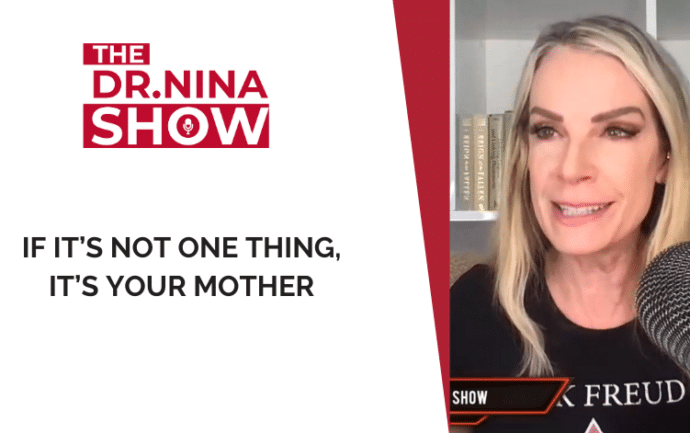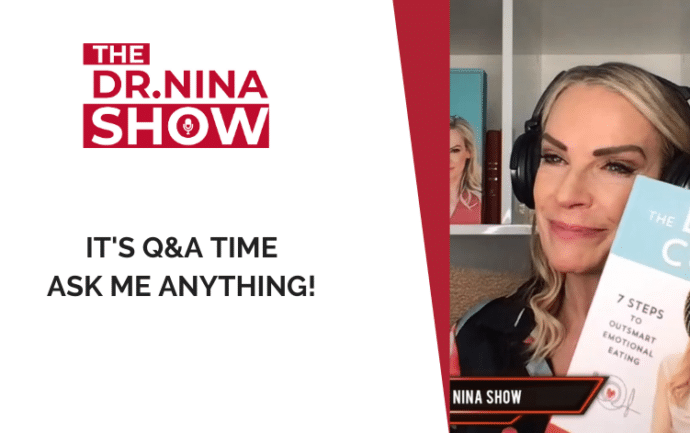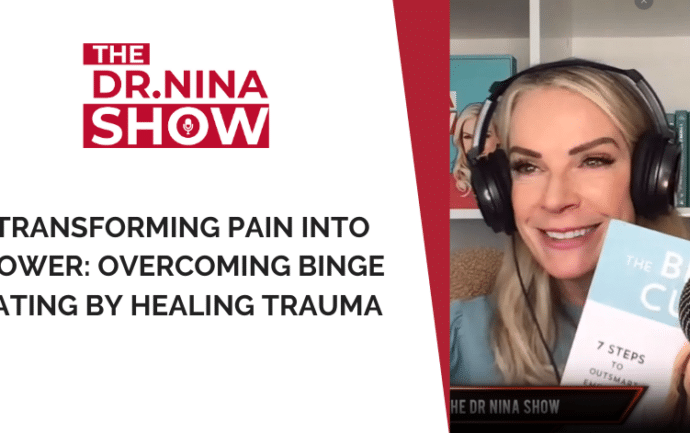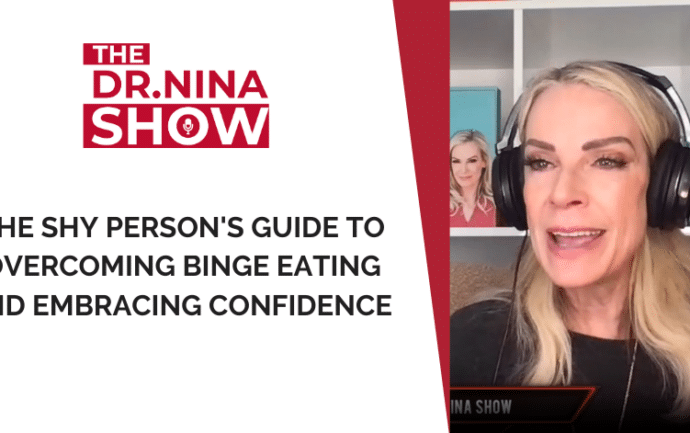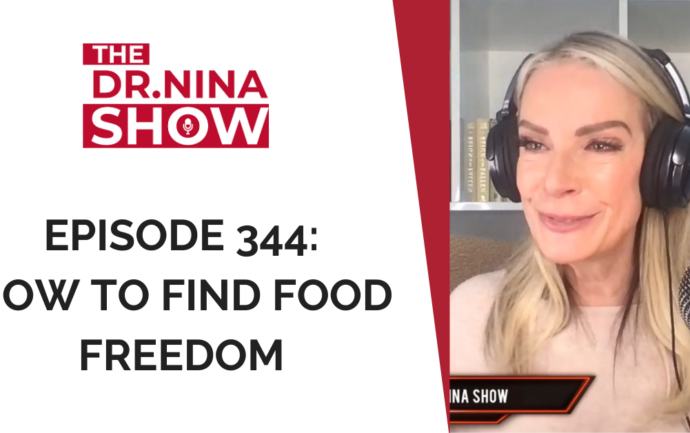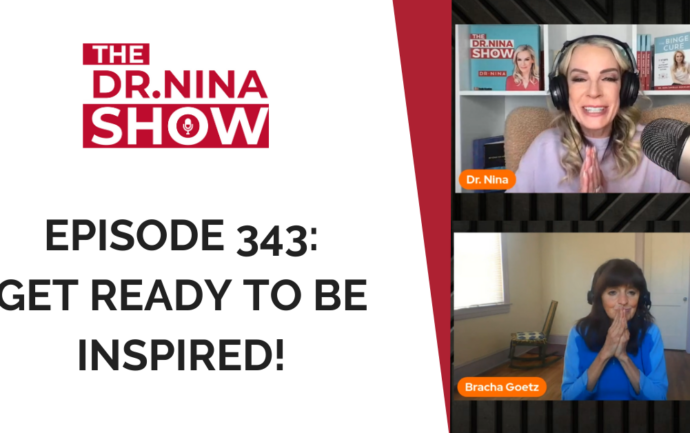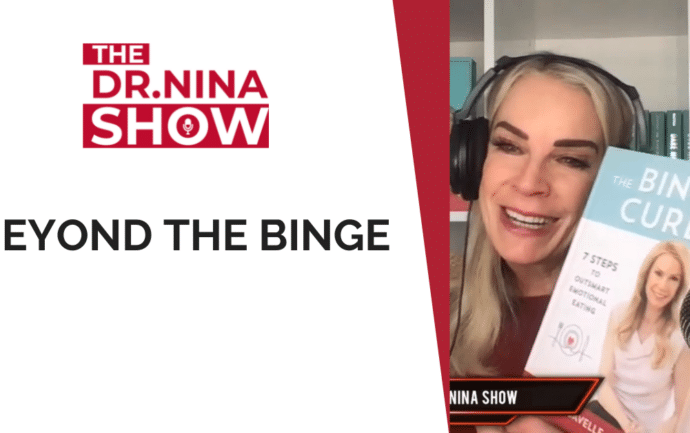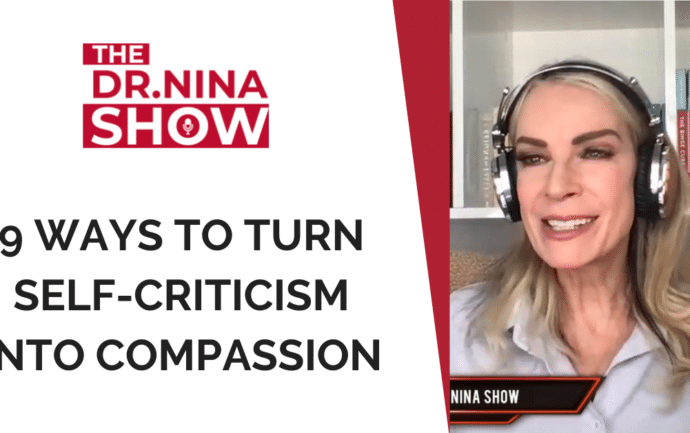Dr. Nina Savelle-Rocklin
The Psychological Reasons For Clutter, Helplessness & Disappointment
Transcript
Dr. Nina:
Hey, there. Welcome to the Dr. Nina Show here on LA Talk Radio. I am your host, Dr. Nina Savelle-Rocklin and I am here to help you stop counting calories, carbs and fat grams so you can easily get to a healthy weight and get on with your life. That is what I want for you and that is what I hope you want for you. To wake up and think about your day, not your diet. How amazing would that be, to wake up and think about what you want to do that day? Not about what you weigh.
If you’d like to call in today, the number here is 323-203-0815. That’s 323-203-0815.
Okay. As you know, the real problem with binge-eating, stress eating, any kind of emotional eating, the real problem is not food. The real problem is what is eating at you. And that is what I’m here to talk about, to help you deal with the root issues that create food problems. Because binge-eating, stress eating, emotional eating, those are all solutions to the problem. They are not the problem. The problem is what’s going on inside.
So I have a question from Anonymous. She wants to be anonymous, and this is the question. She said, “I have clothes that are overtaking my home for myself and my spouse. We both lost a lot of weight in a program and now we’ve gained it all back. I now have a home with sets of clothes for both of us in every size from small to extra-large, which is where we are now. I can’t seem to let go of any of the clothes with the hope I will lose weight and most of all, the cost of the garments.” If she gets rid of the clothes, there goes all the money she spent on it. “I don’t want to put out all that money again for smaller clothes. It’s rooms full of clothes. Winter is coming and I also have winter clothes in all sizes. What can you recommend in this situation?”
Well, Anonymous, a couple of things come to mind. One is you lost weight in a program and I guess that program would probably be some kind of diet. Some kind of diet, and as you know, diets or programs or anything that focuses on food alone ultimately fail. Diets work until you go off them. Diets do not deal with why you are eating. They only focus on what you are eating, hence the problem, Anonymous, that you now find yourself in that you have been on diet after diet or program after program after program, I’m sure, and how here you are with clothes in any size.
So the question is, why are these clothes all over your house? Why are these clothes in every room? That’s interesting. In my book The Binge Cure: Seven Steps to Outsmart Emotional Eating, in my book I talk about some of the reasons people might overspend. I know that’s not what’s going on, Anonymous, but overspend as well as overeat, and that there can be something symbolic about having things in your home. Things in your home provide a sense of fullness. Things are taking up space. And then so we want to look at, well, what is the empty space? What is so hard to be with that you have to fill up your house, in this case with clothes, just like maybe filling up your stomach to avoid some other emptiness.
Again, there’s logical and there’s psychological. Logically, it’s, “Well, Anonymous, you have all these clothes. Why not put them in the garage or store them someplace? Put them in a place where you do not have to constantly look at them.” Secondly, why all these clothes? How may clothes do you really need, even in all sizes? Is there just an abundance of clothes? Too many clothes? In my book, I talk about a patient who just had a thing for buying sheets. She couldn’t stop buying sheets, and she literally had … Someone is saying, “Messes can be comforting.” I don’t see who that is. Ah, Josh. Yeah. Messes can be comforting. So again, there are all kinds of reasons for why you might be creating these messes.
But back to my patient with the sheets. She had 300 sheets. Over 300 sheets, and she couldn’t stop buying sheets. And of course, she had tried to stop buying sheets and she had ran out of room in her linen closet. They were being stored all over the place. And she just said she was sort of addicted to sheets. And as we explored it, she came to realize that she had these memories of going to a friend’s house, and the friend had these very pretty sheets and the friend also had this very lovely home with loving parents. So she associated sheets, beautiful sheets, with a beautiful life, essentially.
So you want to look, Anonymous, at what is it that having all of this stuff, whether it’s clothes or something else, what is having all this stuff mean to you? Logically, okay. Get rid of some of them. If you want to have different sizes, have some of each size. Logically, I understand you don’t want to shell out money again for new clothes. All of that. That makes sense logically. Except there seems to be a huge amount of clothes. What is it that having those clothes fill up your space, what does it do for you? You may think, “Well, that’s crazy. It’s not doing anything for me. I hate it. That’s why I wrote you. That’s why I asked you to solve my problem.” Well, that’s logical. Psychologically, filling up space can mean something. Are you empty in your life and this symbolically fills a space just like people may eat to fill an emptiness or a loneliness within?
There is always a reason for why you’re doing something you don’t want to do. If you’re doing something you don’t want to do, whether it’s eating or having difficulty getting rid of clothes, it’s for a reason, and that reason needs to be understood and processed. So if it is some kind of emptiness, what is that emptiness that you cannot fill with stuff, food in your body or clothes in your house?
Anonymous, I don’t know the answers to the question. Only you know the answers to those questions. So feel free to write me again, fill us in, or call me. Feel free to call if you’re listening, and let’s learn more. But that is where I would you with some food for thought. What is the purpose of all of this clutter? It means something, and that something has be understood rather than, “Oh, just get rid of it,” or, “Just get rid of some of it.” There’s an easy solution, just to have a few outfits in every size and you won’t have clothes all over your house, in every room. That’s the solution. But that’s the solution to the logical. We’re interested in the psychological. I’m interested in the psychological. I hope you are, too. So give it some thought. Let me know what you think.
And again, I invite you to join me here. The number is 323-203-0815. 323-203-0815. Call me. Let me know what is eating at you, what is weighing on you. Because again, the real problem with food is not food. The real problem is what’s eating at you.
Karlygash:
Hello. Good morning, Dr. Nina.
Dr. Nina:
It’s Karlygash. Hi, Karlygash.
Karlygash:
It is me.
Dr. Nina:
How are you today?
Karlygash:
Well, I’m doing somehow. Honestly much, much better than previous weeks.
Dr. Nina:
I’m glad to hear that.
Karlygash:
Yeah, I just found that this disease is so horrible, but right now I think I’m past the stage which is terrified, and I was binging and I just wanted to disappear somehow, so I don’t think about it and don’t deal with it. But now I’m like, “Oh, my God. I need to do this education about the technical part.” And I’m really sad.
Dr. Nina:
For those who are new listeners, this is Lyme disease that Karlygash was just diagnosed with a few weeks ago. Lyme disease.
Karlygash:
Yeah. And it’s a chronic one. Probably I had it since I was a kid and it’s deteriorating my body very rapidly. Like I said, the further I’m exploring the disease, the more confused and horrified I am. I’m very sad these days honestly because I think about my future now and all the dreams and goals I had. Many of them are not a possibility anymore, like having a kid. It’s sad that if you have a kid … But we talked about it. It can cause damage to kid, but I don’t even want to think about it, so later.
I’m very sad because I feel that I am so restricted now by own body. Not by my own body, but by the disease and it feels horrible, honestly. It’s stirred up all this hopelessness when I was kid. My mom was diagnosed with schizophrenia when I was 11. She had her first episode. And then I felt this tremendous feeling of helplessness, not hopelessness, helplessness, where I couldn’t do anything to get into her brain and help her, because she was suffering and she was losing her identity and stuff. First time in my life I felt this unbearable helplessness and it’s a horrible feeling. This feeling is the second time when it broke me. It brought my down to my knees. I don’t know if you can say that about a kid. But then that was the worst part, and my whole life I was looking for treatment for her and helping her and stuff. But now when I have my own illness going on, I feel this helplessness again.
Dr. Nina:
Helplessness is one of the worst experiences that people can have.
Karlygash:
That’s the worst. Honestly, it’s just the worst.
Dr. Nina:
It is. And I just want to say something really fast on how that is associated with food issues. The profound horror and helplessness which can bring us back to childhood or maybe even babies where you’re completely dependent on someone else who may or may not be available to you. The complete horror of helplessness can be overwhelming, and so we can displace it onto food. “I’m not helpless over this area of my life. I’m helpless over food,” which is more, pardon the expression, palatable.
Karlygash:
Oh.
Dr. Nina:
It’s easier to be helpless over food than it is to be helpless over a schizophrenic mother, life circumstances, feeling helpless over a disease that you’re diagnosed with. So you just normalized that.
Karlygash:
Oh, my God, you hit the bullseye. That’s the thing. Because you know, when I was binging this month, the past two, three months, I always had this feeling of helplessness, paralyzing feeling of helplessness. The things happened one after another. My biological father died, I got diagnosed with Lyme, and I was just feeling horrible. So this under-thought back in my head is like, “Why am I doing this? I know how not to do this. I have tools, and they worked before and I’m very smart and strong.” But I could never understand why I was doing this, but it makes so much sense. Of course, it’s easier for me to translate this helplessness into food. I literally felt that I am helpless over food. I was like, “Oh, my God. I cannot stop eating. All these carbs looking at me.” And I was literally binging on them and I felt like their … What do you call it? Trapped by them, like their prisoner or something.
Now thinking back about my helplessness, it’s not even unpleasant. It’s horrible, horrifying, morbid feeling. It’s toxic. It penetrates every cell of my body. When I feel helpless, it’s like I literally want to just lay down and die, because if I’m helpless, what’s next? What can I do? So this feeling is yuck. It’s yucky.
Dr. Nina:
It’s terrible. My colleague, Lance Dodes, actually mentor, and Axel Hoffer, both of whom are my mentors, have written, especially Lance Dodes, written extensively about helplessness. He believes it underlies all addictions, that all addictions are a result of helplessness, and if anyone wants to read his books-
Karlygash:
I agree.
Dr. Nina:
Yeah.
Karlygash:
I agree.
Dr. Nina:
So it’s important to remember, these are the responses to helplessness. One is to get very busy, to work and work and work, to do something. Helplessness is so passive, so being very busy and doing something. Eating is a doing something, that’s one way to deal with helplessness. Another is to withdraw. Another is to become depressed.
Karlygash:
I see all of them. None of them works, actually. I want a healthy coping mechanism now.
Dr. Nina:
Yeah, none of them works. The only thing that works is to recognize and be. Not wallow in, but just be in and process the horrible reality of helplessness and to remember you are helpless in some areas. We are all helpless in some areas. But we have a sense of agency in other areas, and it’s to look at where in our lives do we have a sense of control so that we don’t feel as if we’re just absolutely helpless against the forces of the universe. And so that we don’t displace helplessness over life onto helplessness over food.
Karlygash:
So when this thing with binging comes, whatever I want to binge for unhealthy reasons, I need to stop and really get in touch with my emotions, get in touch with reality, acknowledge the fact that I’m going through this, and honest to myself with words. Right?
Dr. Nina:
Yes.
Karlygash:
Or maybe take care of myself. Go get sleep or take a blanket or get rid of toxic people.
Dr. Nina:
Both.
Karlygash:
By the way, I cut all connections with almost, I would say almost everyone in my life because they are so toxic. And now I’m in this bubble where I’m by myself and I’m like, “Oh, my God. What’s next for me?” Cats and dogs [inaudible 00:18:42]. Like woman surrounded by animals. But it’s my-
Dr. Nina:
No, you make room for people who are good for you and healthy. When you get rid of people who are toxic and drain you and make you feel terrible about yourself or just make you feel terrible, when you get rid of those people, you make room for other people to come into your life who can be more generative, who can bring you something good, not take something away.
Karlygash:
I am so after this now. Because when I was a kid, I was like this and I always chose people healthy. But it’s still very good when a person is there for real and you know it. Not this manipulative techniques all these people use. They give you some attention like, “Oh, honey,” when they need something from you, or they need support and then they’re gone forever, or whatever those people do. But then you feel a genuine connection from the person, so I want that.
And yesterday I was so sad about this relationship stuff. And I said, “You know what? I’ll marry myself. I’ll be my own whatever, mother, father, friend, lover, husband, kid. I will be my own everything.” Because what’s the point of going out there and trying? These people, even if they’re present, they will not fill the hole inside me. It hurts. It’s painful to go through what I’ve been through, and you know what? It devastated me and it still hurts and I’m not ashamed of being hurt. Because I went through hell, and I’m very grateful that I’m still alive and I’m not killing myself, not going on drugs and stuff. I’m honestly, honestly working on shit. It’s hard.
I also want to jump into some unhealthy relationships. It’s easy for me. I’m a pretty woman. But I’m holding myself back. I’m not letting myself go there. I’m like, “No, I’m doing it the right way.” And it’s hard. It’s very lonely.
Dr. Nina:
It’s hard, Karlygash, but it doesn’t mean you forever are everything to yourself. We need to take care of ourselves and we need to be taken care of by others and we need to take care of others. All of those things we need to balance. And when you are good to yourself, when you encourage yourself, when you are nice to yourself and kind to yourself, that’s the kind of treatment you are going to only accept from someone else. If you’re mean to yourself, if you’re hard, if you’re cruel, if you’re discouraging, if you’re hateful to yourself, and then someone else comes along and they’re hateful and judgmental, you’ll say, “Oh, be my friend. You sound so familiar.” But when you’re kind to yourself, when you’re kind and you’re loving and accepting, where you don’t have to be perfect to be lovable because how can you? None of of us can. And someone comes along and they say, “Hey, I’m perfectly imperfect, too. I like you,” you’re going to say, “Oh, let’s talk. Let’s be together.” Because that’s going to be familiar, too, and you’re going to have more of a reciprocal relationship rather than a toxic relationship.
All our relationships start with our relationship to ourself. But it is not enough to only be there for yourself. We need to be there for ourselves, absolutely, and relate with other people. Otherwise, if you’re not with yourself, you’re only relying on other people and people may or may not like us. That’s the horrible thing about life. Not everyone likes us, and not everyone is a nice person and not everyone will treat us well. And if your self-esteem is based on what other people think of you, then your self-esteem is going to be blown about like the winds of the environment. But if you know who you are and you give yourself your own self-esteem, you know who you are no matter what people are like with you, no matter how they treat you. And then you’re going to find other people who are your kind of people, and then it’s good. Then people are safe, and then you can turn to them instead of to food.
Karlygash:
Thank you, Dr. Nina. Sounds like a shortcut. Treating myself nice will automatically penetrate into other areas of my life, including people, coworkers and stuff. And the fact that I said that I want to be with myself, I didn’t want to isolate. But I said it meaning that it’s the first step. I cannot do what I see people around me doing without establishing good, solid relationships with themselves to jump into relationships. I did that many times. Doesn’t work. So what I’m saying is I’m being with myself as a first step to living healthier life. First I will establish nice relationships with myself, and then further I can do it with, like you said, automatically. So it takes time hopefully.
You know what? It gets better. I remember myself when I started two, three years ago with you. Oh, my God. I was in such a very dark, bad place, very horrible. I don’t feel like this anymore. I think about myself better and I’m so grateful to you and I’m grateful to myself because I really did the hard work and I’ll keep doing. And thank you very much that you’re standing on this ground of healthy stuff and we’re paying attention, too. But the food doesn’t matter. The calories, whatever, doesn’t matter. It’s not about the food.
Dr. Nina:
That’s right.
Karlygash:
Because it really took me time to really, really get this idea into me. Mentally I knew what you said and I remembered the words but inside, psychologically, it was still this hope, if I eat less and stuff. But then I said, “You know what? If I binge, I binge.” But I know I would pay attention to what’s going on, why I binge. No, not because I binge. I’m like, “Oh, my God, so many calories I consume.” But what’s going on. There’s is a reason. And always reaching out to you, to the group, to Binge-Free Babes, the Inner Circle, everyone. To your program. I’m just so grateful. It works. It does.
Dr. Nina:
Well, it works if you work it. And you’re an example of tenacity and that if you keep going and you keep going even when things are tough, even though you got walloped by life and went back to binging for a little bit, you can recover faster. When you want to binge, the question is, “Well, what do you really want?” It’s not about food. What is it that I want? Do I want to just not feel this? Do I want to comfort myself? Do I want to escape myself? Binging is often self-abandonment, or it’s a way of giving yourself what you need but in a not-good way. So sometimes people are really anxious and they binge to calm down. Binging can calm down their bodies, or fill a void or symbolically get sweetness.
When you get more interested in yourself instead of abandoning yourself, which is, Karlygash, what you do every week. You call me. You are interested in you. Even when it’s hard, even when you’re talking about difficult, painful, awful things, you’re staying interested in you instead of focusing on, “Well, you ate this or that.” And that’s what gets you through.
Karlygash:
Thank you.
Dr. Nina:
That’s what gets you through the pain.
Karlygash:
Sometimes I feel like other people are doing so good. I feel like the dumbest one. Am I the only one who cannot figure it out by now? But then I’m like-
Dr. Nina:
Karlygash, you’re the one who’s brave enough to call it in. I get messages from people all the time, saying what kind of dire straits they’re in but they’re too scared to call. I get messages from people saying, “I admire Karlygash, or Karly.” Sometimes they don’t know your name. They think your name is Karly. It’s Karlygash. And they’ll tell me, “Wow, I admire her. If she can do it, I can do it.”
Dr. Nina:
Believe me, you are not the only person who is struggling. You are the person who is calling me consistently, but other people are relating to you and other people are moved by you and many people have a similar story. They’re just not calling. You’re calling.
Karlygash:
Thank you so much. It helps so much knowing that other people are dealing with the same thing as well. And I encourage everyone to call. I on purpose am calling and I’m doing this on purpose helping myself, because I have a lot of shame about my life, whatever happened to me. It’s always struggle to call but I call and I verbalize it. I want to put myself out there, so this is how I deal with the shame. When I call and talk, every time I feel shame and I feel like, “Oh, my God, it’s going to be there. It’s going to be recorded. Anyone can listen to it and know about the problems in my life.” And then I’m like, “So what? Everyone has stuff. I’m dealing with my own the way I can.” Let me [crosstalk 00:29:41].
Dr. Nina:
Absolutely. It’s not shameful to struggle. It’s called being a person on this planet. We face struggles sometimes more and sometimes less, but everybody has something that he or she is struggling with. It’s how people deal with that struggle. Many people just pretend it’s not there. Other people try to drink it away. Other people try to eat it away, stuff it down. Other people work it away. People try many different ways of trying not to feel and not to process their reality, but the only way out is through. You can’t just let something go. You can’t positive-think it away. You can’t stuff it down. You can’t starve it away. You can’t work it away. You can’t get rid of any kind of feeling or conflict. You could only process it and work through it. And so I want to thank you for your consistency and for calling every week and sharing your process, your truth.
Karlygash:
Thank you, Dr. Nina for being there for us. And really, I’m really grateful, forever grateful. You are so amazing. And like you say, I am saying nice things about you because I really love you and I really respect you and I really admire you, from the bottom of my heart. From the bottom of my heart. You’re just really incredible. The tremendous amount of people you’ve helped. Your help is so intangible. It’s so priceless, so precious. There is nothing in the world I can compare to help you gave me. Honestly there are not even words enough to describe it very precisely.
You really helped me. I was in a really dark place a year ago. Honestly, nothing was interesting for me. But slowly, but surely, with your help, I got out and I’m moving on. Thank you so much.
Dr. Nina:
Thank you, Karlygash. That’s very moving to me. Getting a little misty here.
Karlygash:
Aww.
Dr. Nina:
Thank you. Thank you. Aww.
Karlygash:
I love you.
Dr. Nina:
All right. I’m sending you a big hug and look forward to talking to you soon.
Karlygash:
Thank you so much. Me, too. Have a wonderful day, and I love you and I love all the colors and the people.
Dr. Nina:
Well, we love you, too. Bye for now, Karlygash.
Karlygash:
Okay. Bye, bye.
Dr. Nina:
That makes me happy. I’m getting a little teary. It’s possible to … Whoops. New caller. Hi.
Susan:
Hello?
Dr. Nina:
Hello.
Susan:
Hi. I’m calling. My name is Susan, and I wonder why you don’t talk a lot about anorexia and restriction.
Dr. Nina:
Because my specialty is binge eating disorder. In clinical private practice, I treat all eating disorders, but as far as my latest book, this program and all my online programs, I only deal with binge eating disorder.
Susan:
Okay. Okay. Just curious. Thank you.
Dr. Nina:
You’re welcome. Did you have a question? Oh. That said, since you’re here, did you have a question about restriction or anorexia? No, she’s gone.
Okay. Well. I guess that answered that. Yes, this is not a show about eating disorders. This is a show about binge eating disorder, stress eating, any kind of emotional eating. If anyone is interested in my thoughts on anorexia or bulimia, although I have talked about bulimia here on the show. Very symbolic. I encourage you to read my book, Food for Thought: Perspectives on Eating Disorders, in which I go quite in-depth on all eating disorders included anorexia.
I am going to talk about disappointment, because I get a lot of people telling me how disappointed they feel. And I can relate. I can relate. A lot of things are very disappointing right now. I had a TV show that was going to go to network in March, and well, that ended. And then of course I feel lucky to be alive. I feel lucky to be doing what I’m doing, so I’m balancing disappointment with recognizing that I am in a good place, and a lot of people are not. And I talk about this a lot, that so often we have this tendency to look on the bright side. And see, I’m guilty of that myself. We try to look on the bright side, but we forget there’s also a reason we’re feeling down.
And this is a disappointing time. It’s very disappointing. It’s very scary. So I wanted to share an article called Coping with COVID-Related Disappointments on Sharp Health News. The writer Jen Spengler talks about, and this was March, end of March, all that things at that time that her family had missed out on. No high school graduation, no college graduation canceled, family-owned business closed indefinitely. The stress of that, the loss of income. Big birthday celebration called off. Four sports seasons cut short. Grandparents who couldn’t be visited. All other challenges that I think we can all relate to along with closed schools, social isolation. These are part of the pandemic-related disappointments.
And she says, “We are the lucky ones. So lucky we feel uncomfortable even mentioning these disappointments, because none of us are sick in her family. We have a home to live in. We have access [inaudible 00:36:42] for our children to continue their education.” She says she has a job she loves. She can do it from home. She has food in her refrigerator. She has Wi-Fi, electricity, cell phone service. “However, we all deeply these disappointments and aren’t quite sure how to process them. Can we discuss them with friends who might have even greater challenges? Can we share our concerns on social media without fear of being shamed for not considering those in worse situations? Do we have a right to think of ourselves when so many others need our attention?”
Well, yes. My answer is yes. So basically, she talks about how can we cope with our disappointment over COVID-related cancellations of events when other people have much greater losses. And she suggests to recognize and identify that these things are also losses. Events that you prepared for, events that you have dreamed about, events that are rites of passage. And now you won’t have them. You don’t have the photos of graduation. You don’t have the photos of the trips. You don’t have the memories that you thought you would have. Won’t be able to share memories because they will not exist in the way that you thought that they would, and that in itself is disappointment. Not being able to share experiences such as proms and graduations, weddings, bar mitzvahs, bat mitzvahs, any other kind of celebration. Quincineras.
That is heartbreaking. It is in itself heartbreaking. So acknowledge the feelings of hurt, disappointment, sadness, worry and anger. The more we try to minimize or push away our emotions, these emotions don’t feel good, of course. But the more they weigh us down, and that is an interesting way that she puts it, the more that they weigh us down, because what are we talking about on this show? How what is weighing on us can get expressed with our relationship, with ourself and with food. Over time unresolved feelings will impact how we cope with other stressors, how we feel about ourselves and how we interact in our relationships. So these disappointments matter, and being able to express it without guilt …
Look, I’m, quote, unquote, “guilty” of this myself. Monday was the fifth month anniversary, April, May, June. Fifth month anniversary for someone that I care deeply about died of COVID. And I was disappointed about something, I don’t even remember what, and I felt guilty because I said, “Well, at least I’m here. She’s never going to have the chance to be disappointed over something like this. She’s never going to have a chance to worry about this.” And then I caught myself. She won’t and that is tragic, but I still get to have my own disappointment, and so do you. Comparison is the thief of joy. Do not compare your disappointment over what you’re not able to do in life with other people’s far worse tragedies.
“These disappointments,” says the writer, “are minor compared to others such as concerns about illness, homelessness, food insecurity. So how can we cope with the guilt we have over feeling disappointment about things like canceled parties and events? Comparison,” she says, “can be a useful coping tool as long as we are not minimizing and invalidating our own feelings. Imagine the language you would use with a friend if they told you, ‘I’m so sad I can’t go to that big family reunion that we’ve been planning for three years.’ Your response most likely would not be, ‘Ha, that’s nothing compared to what my dad is going through. His work hours have been cut.'” You wouldn’t compare two totally different things. You’d say, “Yeah, that’s horrible. You were really looking forward to that trip.” So give yourself the same compassion you give others. I know you’ve heard me talk about this a lot on this show. It is so important to be to yourself as you are to other people, to be as compassionate and understanding to you as you are with others.
So what can we do to cope with these feelings of disappointment? First of all, notice the negative self-talk. If you find yourself saying, “Well, I shouldn’t be disappointed over something like this. This is so ridiculous. This is so little. Other people don’t know where their next meal is coming from or how they’re going to pay rent. I shouldn’t feel bad about not being able to have my Thanksgiving Day normal celebration.” No. You have the right to feel what you feel. There’s no should. Don’t should on yourself. What you feel is real and what you feel needs your attention, not your condemnation. Don’t should on yourself. Pay attention to what it is that you are feeling.
Another way to cope is to journal. It’s very powerful to journal. There’s something about writing down your thoughts, writing down your feelings that really gets them out. Thinking about them, they could just be stuck in your head. But something about writing gets it out, gets it on a screen or on a page. I even prefer a page. And when you get your feelings out, you’re less likely to stuff them down.
Also when you’re disappointed, don’t hold it in. Tell someone. Call a friend. Let someone know. Let someone know, a friend group or if you’re in a Facebook group or just your spouse, your partner, somebody. Talk to that person. Don’t hold it in. Let people know that you are struggling with this disappointment. And if they say something to you like, “Oh, it could be worse,” that’s not a person you can go to. Find someone else who will say, “Yeah, I get it. It’s hard. Call me.” Call me. I’m here every Wednesday at 11:00. Call me. Share your disappointment. What is that old phrase? Worries shared are worries halved. I love that.
Also maintain a daily routine. It is important to get enough sleep and do something that you enjoy every day, because otherwise you can start to really focus on the disappointment and focus on how bad you feel, and that can exponentially grow and then disappointment can become depression. We don’t want that.
She says, “Practice radical acceptance. This is the concept of accepting that our reality is our reality, and our reality cannot be changed in the moment.” We may not like it. We may embrace it. We may not want it. We can’t change it. When you find your mind ruminating over thoughts of, “Why is this happening? This isn’t fair. I can’t believe this is happening to me. This always happens to me.” Well, that’s a slippery slope to trouble. Instead use a coping statement, not a question, that feels right for you, such as, “I will get through this. I don’t like what’s happening, but I will get through this.”
This is why I developed, by the way, my VARY technique, my VARY coping technique, which stands for validate, acknowledge and reassure yourself. V for validate, A for acknowledge, R for reassure, Y for you. So you say, “This is what’s happening. It’s really painful and upsetting and disappointing. Of course, it is. How could it not be? Of course it’s disappointing that I didn’t get to graduate from college. I didn’t get to go see my first grandchild or I haven’t held my niece in my arms or I didn’t get to have that family reunion. We didn’t get to have that wedding. We didn’t get to go on that trip, that amazing trip to Europe that we had planned. We didn’t get to have that family reunion. We didn’t get to have what we wanted. It is upsetting. Of course, it is.” And then you reassure yourself. “This isn’t going to last forever. This is what’s happening now. I have been through tough times before. This is a tough time, and I am getting through it along with lots of other people. I’m going to be okay.”
I keep thinking about that line from The Best Little Marigold Hotel. “Everything is going to be okay in the end. If it is not okay, it is not the end.”
Next question in the article. What can we do to get out of our present disappointed mindset and look forward to what’s to come? So here are some things that she suggests. Write a gratitude list making note of all the good that is in your life, even the small things. Without, I should note, say, “Well, because I have these things I am grateful for, I shouldn’t feel disappointed.” The idea is to hold both. Yes, I’m disappointed over X, Y, Z or I’m disappointed over A, B, C, D, E, F, G, H, Y, et cetera. There are a lot of things to be disappointed over. And I’m grateful over these things.”
And then create some activities and events that can be rescheduled. Okay, you’re not going to have the wedding that you planned. You’re going to have 10 people in your backyard or two or nobody, but down the line, you’re going to have that big celebration. You’re going to have everyone gathered there and you’re going to celebrate together. You’re going to make memories then. Think about things that you can reschedule. You can reschedule the family trip. You can reschedule other things. You can do part now and part later.
Consider ways you can celebrate using technology. You can start a group video chat. You can have a family reunion over Zoom. I know everyone is Zoomed out. I get it. But maybe it’s a way to connect. Maybe it’s better than nothing. You can share silly selfies. You can be creative and find another way to celebrate other than the way that you thought you were going to be celebrating.
Next question has to do with helping loved ones that are dealing with disappointment. And again, same thing. Validate and acknowledge and reassure. What you don’t want to do is ever say to yourself or anyone else, “Oh, it could be worse,” even though it’s really easy to go to that place. I have been guilty of it myself, but I had to catch myself and say no. It could be worse. And this is bad. It doesn’t matter whether it could be worse. What you’re going through is bad. It’s disheartening. It’s scary. It’s upsetting. It’s disappointing. So recognize both and hold both and you will feel better.
So that is our show for today. Thank you so much for joining me here on the Dr. Nina Show here on LA Talk Radio. I am here every Wednesday at 11:00 Pacific. You can listen Wednesdays at 11:00 at LA Talk Radio or Instagram, or you can listen later anywhere you get podcasts like Apple Podcasts. And I mentioned my book a couple times today. If you would like to get two free chapters of my book The Binge Cure: Seven Steps to Outsmart Emotional Eating, just head over to my website, drninainc, that’s D-R-N-I-N-A-I-N-C, dot com. Drninainc.com. And you’ll see a way to get your hands on the first two chapters of my book for free.
Dr. Nina:
So everyone please stay safe, stay healthy and be nice to yourselves. I’ll see you next week. Bye for now.
The Author
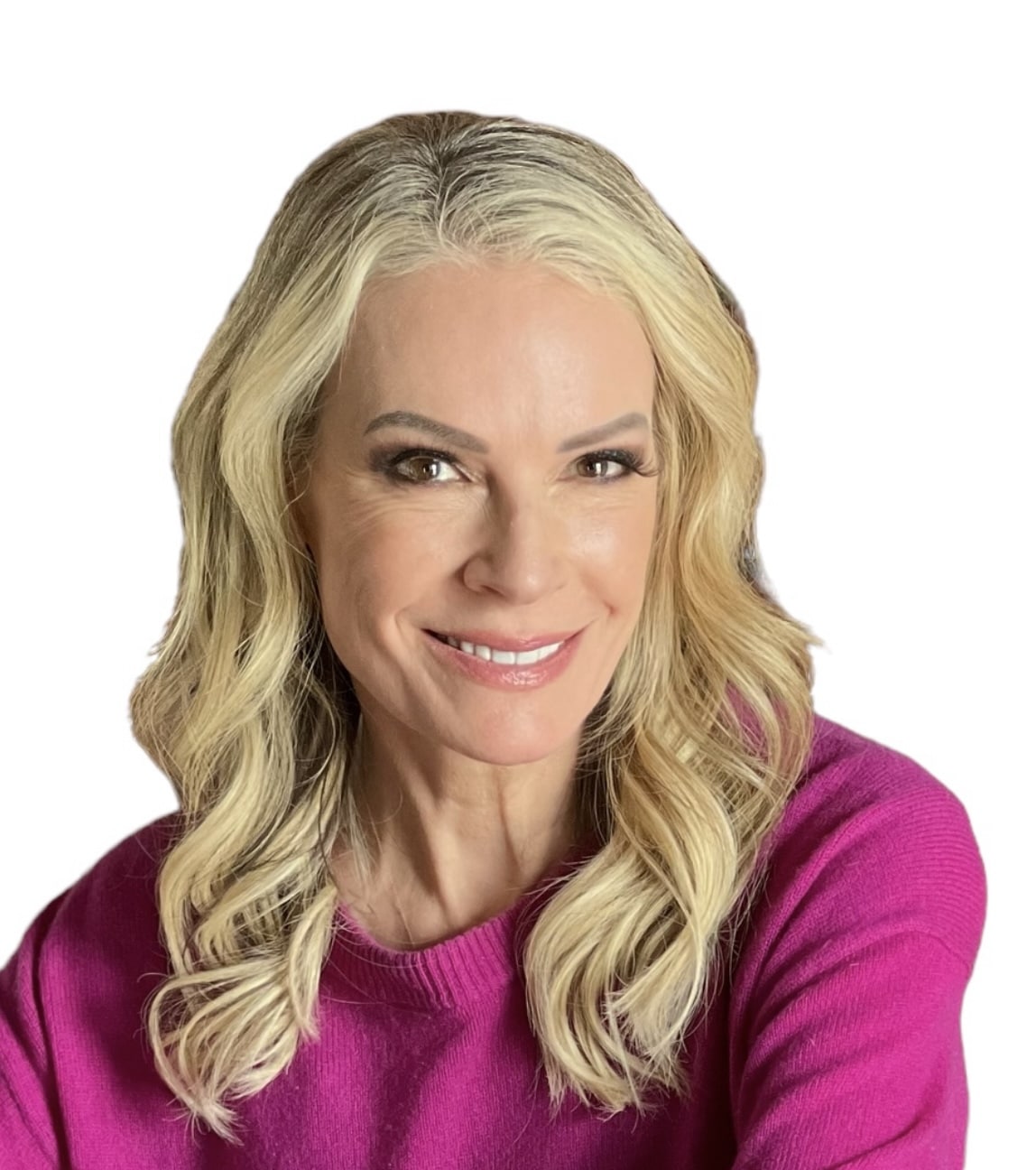
Dr. Nina Savelle-Rocklin is a psychoanalyst, author and radio host specializing in binge eating disorder. She is the author of The Binge Cure: 7 Steps to Outsmart Emotional Eating and Food for Thought: Perspectives on Eating Disorders, and co-editor of Beyond the Primal Addiction. She hosts The Dr. Nina Show radio program on LA Talk Radio.
More episodes

